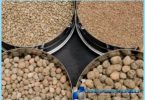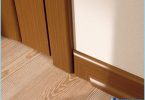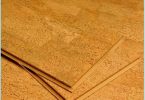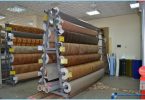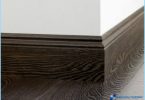Linoleum is one of the most popular flooring, thanks to the small price, as well as an easy and quick method of installation. In addition, the linoleum has a huge variety of colors, starting from the simulation under the kitchen tile to rare species of wood.
But before you purchase this cover, you should know what are the varieties and for what purposes it is used, so that later no problems.
Types of linoleum ↑
This files most often uses natural polyvinylchloride (PVC) coating.
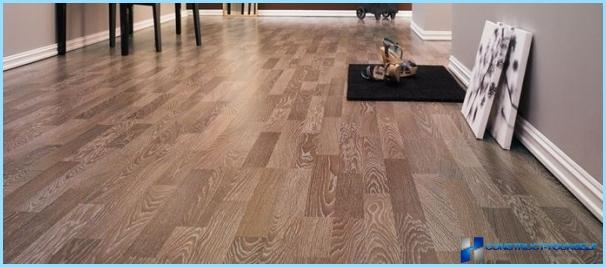
The Foundation is made of natural jute and additional components, such as pine resin, wood and cork flour, linseed oil and so on.
Positives:
- environmentally friendly and safe;
- resistant to sunlight;
- not illuminated;
- has antibacterial properties.
Negative:
- does not tolerate high humidity, which is not recommended to lay in the kitchen and the hallway;
- not much bending, as it can crack;
- the high price.
The basis of PVC linoleum, as its name suggests, is polyvinyl chloride. Also included various additives (colorants, stabilizers, and more).
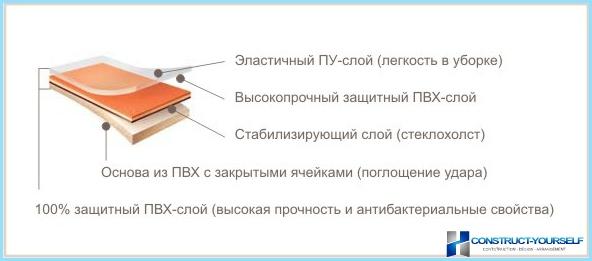
This material is resistant to moisture, environmentally safe, has anti-static coating and low thermal conductivity.
But shrink after installation, at very low temperatures hardens and can crack and also resistant to solvents and products containing lye.
PVC linoleum is made of 4 types:
- household – the total thickness is not more than 4 mm, either polyester or foam;
- semi-commercial – the same basis as domestic, but with a thick protective layer for heavy traffic (kitchen, office with a small cross);
- commercial – it has a thick protective layer;
- specialized – made for a particular purpose (sports, anti-slip and so on).
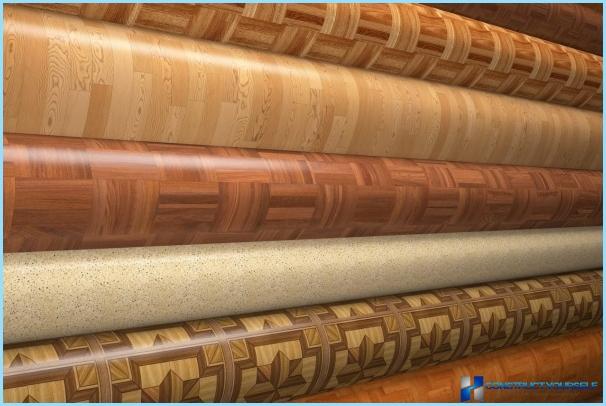
Each linoleum manufacturer puts labeling of two digits in order for the material applied in the right conditions.
Marking the first number:
- 1 – for sites with a small cross;
- 2 – the material can be used in a residential area;
- 3 – allowed to lay in offices.
- 4 – only for industrial buildings.
The second figure marking the degree of possible loads (1 to 4).
Linoleum should be chosen depending on the degree of the future load on it.
Surface preparation and what it is possible to lay linoleum ↑
The first stage is before you lay linoleum, you will have to empty the entire room of furniture and other things and also to remove baseboards.
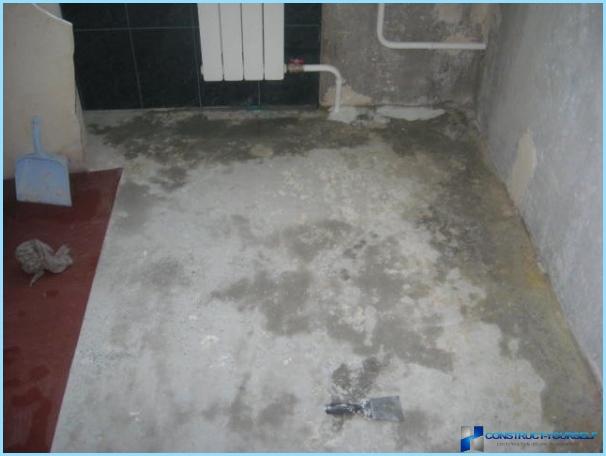
The second stage is the measurement space to calculate the amount of material required. Can be measured with an ordinary tape measure or laser.
Linoleum can be laid on wooden and concrete floors. In any case, the floor surface must be clean, smooth and free of damage (cracking, chipping, lifting and the like). Therefore, the third stage – preparation of the floor surface.
Completely removed the old finish, as the linoleum repeats all the bumps.
Concrete floor ↑
Cracks in concrete floor sealed with cement mortar and polished, it is also possible to grind small bumps.
If a concrete Foundation has too many cracks and different height, then you should make a new screed and apply the self-leveling mixture.
Before laying linoleum on concrete floor, it should be warm, otherwise the floor will be cold.
First, the floor was covered with a layer of waterproofing, for example, polyethylene film. The trail leaves overlapping each other (about 20 cm), as well as to intercede on the wall (about 5 cm). All sheets glued together with sticky tape.
Then installed the joists (their height should be equal to the height of the insulation). Between them fit insulation. Only after laying all closed with a plywood or chipboard sheets. The sheets are fastened with screws, and hats must be deepened (as you may tear the linoleum).
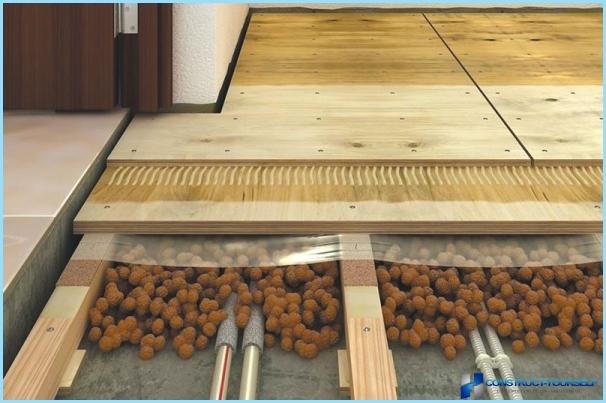
The joints between sheets sealed with putty. After drying, all carefully sanded and cleaned from dust and debris. Then checked the reliability of the coating and the lack of difficulty (it is enough for him to walk and listen).
Now the floor should be primed.
Hardwood floors ↑
Before laying linoleum on the wooden floor, it too must be aligned and clean. Old paint, for example, paint should be completely removed. The surface is leveled by grinding or sanding.
Be sure to check all the boards and joists. So everything was firmly secured and did not creak. If a Board is broken or rotted, it should be replaced by new.
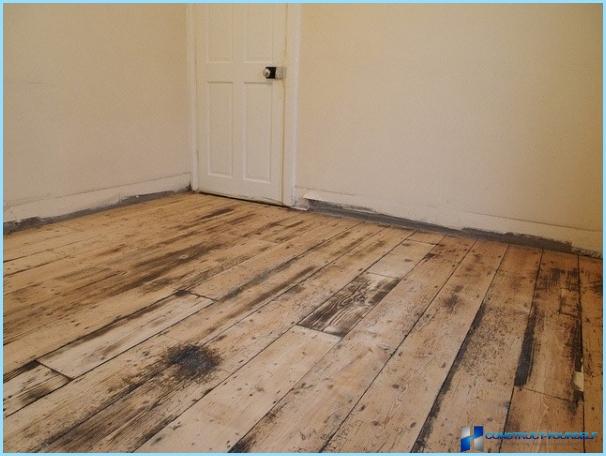
The joints sealed with putty and sanded again.
You can prepare the floor in another way – by laying plywood or particle Board.
In any case, before you lay linoleum, wooden floors, be sure to primed.
Old linoleum ↑
New linoleum can be laid on top of the old linoleum, but only if the old is not full of holes and not soaked through with dirt, dust and dampness.
Before laying linoleum on the old linoleum, the surface should be cleaned of dirt and grease, and then carefully dried. Then applied the primer, it will make the top layer the more dense.
Laminate flooring ↑
Laminate flooring also can be laid over linoleum. Importantly, the coating was smooth and the moisture content was less than 2% (it is easy to check all the same plastic wrap). Linoleum also needs to be dense and not soft, otherwise in the case of the laminate will distort.
Plus, this method of laying linoleum will play the role of insulation and sound insulation.
Before you lay laminate flooring to linoleum, you need to put a cork backing. She will perform the role of a shock absorber and prevent damage to the laminate due to mechanical effects.
Next, the laminate is placed according to the conventional technology.
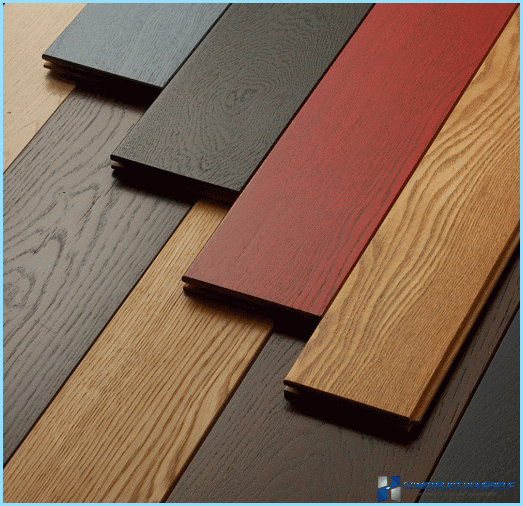
Carpet ↑
Is it possible to lay carpet on the linoleum? It is possible, but only in case excellent condition linoleum, that is:
- totally intact, without cracks and holes;
- smooth surface;
- clean and dry.
Lay the carpet on the linoleum exactly the same as on the new floor.
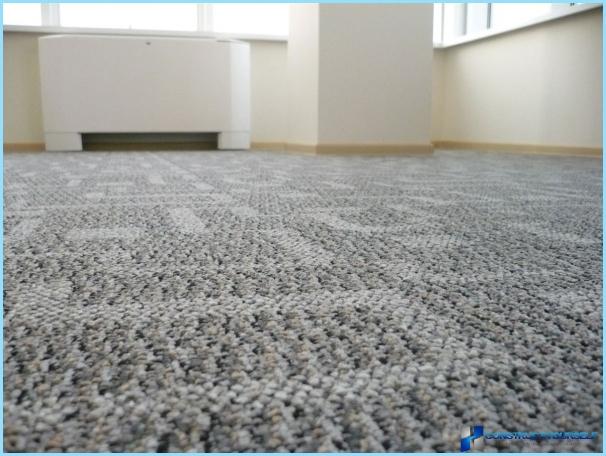
The technology of laying linoleum ↑
After the acquisition of the linoleum should be left in the room to its temperature became equal to room, it is especially important to do so in winter (at low temperatures linoleum loses flexibility, the result can be broken). Once warmed, you must roll the roll that was smooth and without waves.
If the linoleum is without reason, then it will need substrate, or the floor will be cold. Often use cork, jute or linen backing.
Cork is recommended to choose only the best brand, as it does not tolerate load.
Purchase linoleum with a width equal to the width of the room, then there will be no seams. But if this is not possible, the direction of the joints should follow the direction of the light (the window), then they will be virtually invisible.
Now step by step look at how to lay linoleum.
The spread sheets with the overlap on the wall. To one of the walls from the sheet to lie flat, with a gap from it by 4-6 mm, if the wall is straight. Then you have to do pruning only on three walls.
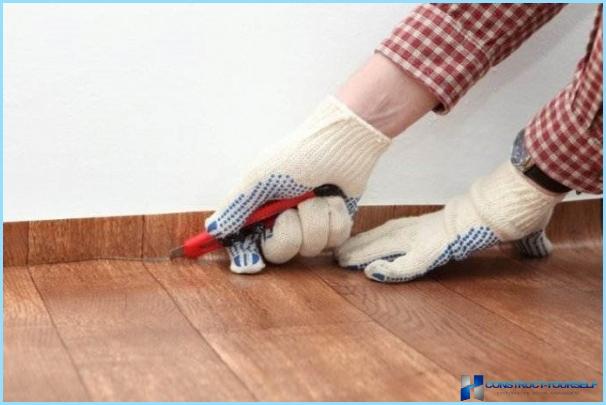
If you make the linoleum with a pattern in several rows, it is necessary to combine. Remember, drawing should be parallel to the walls.
Once all the sheets are aligned at the perimeter of the room, begins pruning. Linoleum to buckle and mark with a pencil where to cut (don’t forget that after trimming between the wall and the coating gap was 4-6 mm). Now unbend the edge and connect all the marks with a ruler. Cut off the excess part.
If you have no experience in pruning, the first cut, leaving a margin. And then measure again and cut.
Optional to glue the material around the room, just on the perimeter. The adhesive is applied with a trowel with very small teeth or roller, then applied to the linoleum and rolled using a rubber roller to flatten and expel excess air.
At the junction of the adhesive is not applied, leaving them not glued approximately 12-14 cm.
Double sided tape should be glued all over the room in a grid, with a step between the bands of 20-30 cm, while leaving a protective film. After that, spread out the cover, removed the protective film from the adhesive tape and pressed down.
After the linoleum is laid, it is possible to connect the seams (recommended to do in one day, after gluing). The best quality and invisible seam is obtained by the method «cold welding». The seam is glued to the masking tape, then blade between the junction of the leaves and cut it with a tube of glue and a special needle is gradually injected glue. When the edges tightly.
The tape can be removed within the time specified in the manufacturer’s glue.
Linoleum can be laid with his own hands, so as to carry out all the work does not require special tools or skills.
Useful recommendations ↑
How to determine the quality of the material?
- The smell of it. The quality surface will not be sharp unpleasant odor.
- The eye. Clear picture and should not be greasy.
- To the touch. With pressure rapidly returning to its previous shape, and when bent must not break.
Is it possible to lay linoleum on the floor warm?
If it is not prohibited by its manufacturer and is composed of natural ingredients.
What better to lay linoleum in the kitchen?
The most suitable material – natural or synthetic, impregnated with antibacterial coating. And with anti-slip surface, so that in case of wet not to slip.
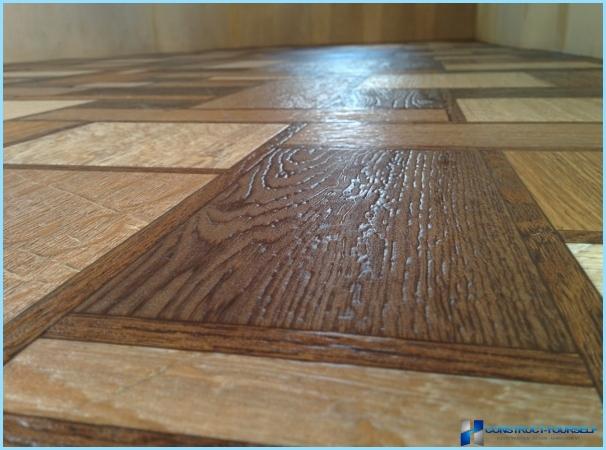
Before you buy, read with the producers of this coverage (for example, read reviews online, browse their sites and that used for production) to make the right choice and to buy really high quality and harmless material.

